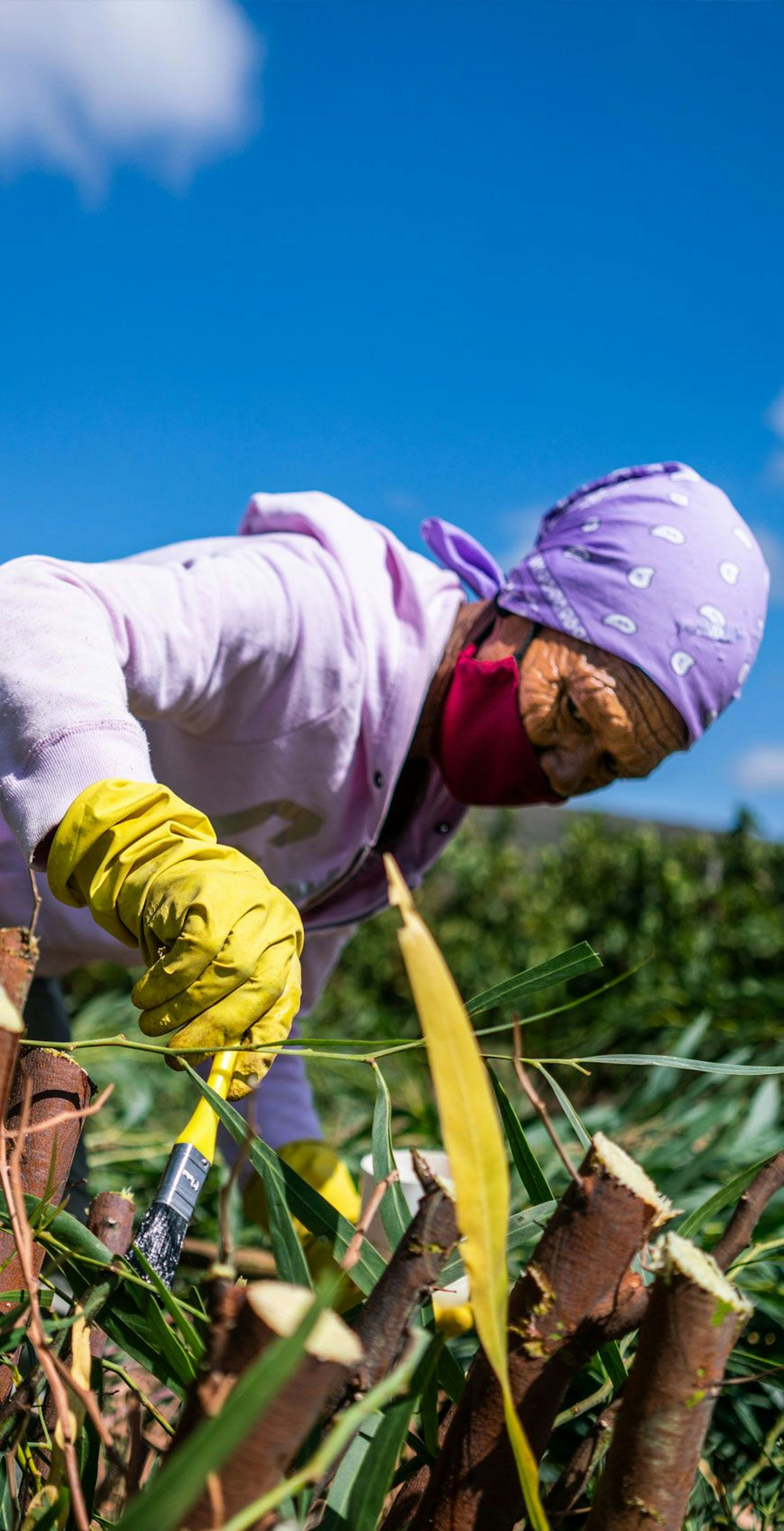Salient Issue
Living Wage
For workers, a decent standard of living depends on a wage sufficient for food, housing, education, health care, transportation, and other essentials. However, in many countries and industries, workers’ earnings come up short.
Wages that are grossly below a living wage have been documented in many commodities and countries. This includes wages for plantation workers in tea in Assam, India (wage gap of 81%) and Kenya (62%); flowers in Ethiopia (69%) and Kenya (48%); wine grapes in South Africa and Chile (50%); bananas in Côte d’Ivoire and the Dominican Republic (40%); and coffee in the Minas Gerais region in Brazil (40%).
On millions of small-scale farms, both hired workers and smallholder farmers live in poverty. Salaries for garment workers are also exceedingly low, with some estimating that workers in Bangladesh would need an 80% raise to get close to a living wage.
Piece rate work, which makes earnings unpredictable, is common throughout industries where Fairtrade works. For example, workers who harvest coffee are typically paid by the kilo, which makes their daily earnings reliant on weather and sick days are unpaid. Due to price pressures, banana plantations also increasingly resort to piece-rate, temporary, subcontracted or casual work, all of which push worker incomes lower.
Informal work is linked to a low pay and limited access to social security. Informality is a defining feature in the artisanal gold mining sector with workers’ earnings fluctuating wildly based on production, price level, and deductions for materials, royalties, and taxes.
Vague work terms leave workers uncertain about how much, when and where they will be paid. For example, many banana workers in Ecuador receive no written contracts or payslips.
Substandard benefits are a major risk in tea, wine, and fruit production. Tea workers often live on or near the tea plantation and rely on in-kind benefits from their employer. However, there are numerous instances where poor quality and costly housing, healthcare, education, and other benefits have exacerbated malnutrition and left tea workers indebted to their employers.
Wine workers in South Africa have reported employer-provided housing with no running water or electricity, mouldy walls, and broken toilets.
Migrant workers, minorities and women report particularly low wages. Nicaraguan migrant workers are often paid less than locals on pineapple plantations in Costa Rica, while the piece rate for home-based female sports balls stitchers in Pakistan is typically lower than for male factory workers.
Families of informally employed migrant sugar cane workers in India have been documented living in make-shift tents in the fields where they lack clean water and sanitation and are paid well below even the minimum wage.

According to research
Fairtrade is having a positive impact in producers’ income, wellbeing and resilience.
Exploring Fairtrade’s Impact, 2022, page 23.

Action
Fairtrade's response
A living wage is a human right. Furthermore, sufficient incomes are crucial to fulfil several other rights, including rights of the child, health, education, and a decent standard of living.
Living wages are a core goal in Fairtrade’s strategy. Our ambition is for workers to gain the power to negotiate on wages and working conditions, and thus improve their own livelihoods. We advance this through a holistic set of measures: advocacy work, ongoing support for farmers and workers, Standards and auditing, development projects, awareness-raising campaigns, research and partnerships.
Fairtrade is the only certification that combines a fair Minimum Price for products and a set Premium that workers can invest according to their own priorities. Fairtrade’s impact on incomes is well researched, and studies typically find that Fairtrade has a positive impact on incomes and economic resilience and Fairtrade workers fare better in their economic standing than their country’s average.
Every organisation involved in global value chains has a role to play in achieving living wages for workers on plantations1, and other organisations with hired labour and small-scale farms.
1: On this page, we use “plantations” to refer to organisations using hired labour.
Fairtrade's response in detail
1. Preventive and mitigating measures
Fairtrade utilises a variety of tools to prevent and mitigate2 the risks around living wage at the plantation and farmer organisation level.
The Fairtrade Standards are one of these tools. The Standards include several requirements on wages:
- Minimum wages. Both plantations and farmer organisations must set salaries for workers according to existing Collective Bargaining Agreements (CBA), official minimum wages for similar occupations or regional average wages, whichever is higher. Studies on flower workers find that this makes Fairtrade organisations attractive for workers.
- Deductions and in-kind benefits. All deductions from wages must be legal, approved by the workers, and in line with the actual costs of the offered in-kind benefit. Where housing is provided by the company, it must be in decent condition, regularly maintained and not over-priced.
- Piecework requirements. Piecework is required to provide the same level of pay as hourly work, with a manageable workload and normal working hours.
- Standard Innovation. Wage floors have been developed for some of the product-specific Fairtrade Standards. For flowers and plants, a Fairtrade wage floor was added in 2017. Achieving living wages will require long-term commitment with steady progress. Workers at one plantation in Tanzania saw wages increase by 30 % and some plantations in Uganda had to double wages to become certified. A wage floor for bananas, which came into effect on 1 July 2021, marked a significant step towards a living wage for thousands of banana plantation workers worldwide.
- Continuous progress on wages. Plantations and other hired labour organisations must make continuous progress on wages with the goal of achieving a living wage. Companies must negotiate with elected worker representatives to establish a timeline towards a living wage that goes over and above inflation. In times of high inflation and economic turbulence, this can be a demanding requirement.
- Collective negotiations. On plantations, the management must engage in collective negotiations on wages and working conditions with a trade union or other democratically elected worker representatives. Please see further information on the labour rights and conditions page.
- Fairtrade Minimum Prices. The Minimum Price provides producers with a safety net against market price fluctuations. Buying companies must pay producers at least the Fairtrade Minimum Price or the market price when it is higher. Minimum Prices aim to cover the costs of sustainable production and are reviewed regularly in consultation with producers and traders. For a few commodities – flowers, herbs, herbal teas, spices and sugar – setting a Minimum Price is practically impossible given the number of variables, qualities and production areas. In these cases, Fairtrade utilises requirements in product-specific Standards to ensure that producers benefit from other aspects of the Standard.
- The Fairtrade Premium. Buyer companies are required to pay the Fairtrade Premium, which allows workers and farmers to invest in projects according to their priorities. Find an overview of the use of Fairtrade Premium here. Plantation workers decide democratically each year how to use their Premium money. Normally up to 20 % can be distributed equitably amongst workers as cash. When the majority of workers are migrants, that limit increases to 50 %. In banana production, where Premium revenue is highest, 30 % must be disbursed in cash.
To explore the full set of Fairtrade’s Standards on living wage, please see the bottom of this page.
In many commodities, the Fairtrade Standards, auditing and corrective measures are insufficient for reaching living wages. Current wages are so far below living wages, that individual plantations and farmers have no way to achieve a living wage for workers and remain competitive in the market. Stronger minimum wage legislation and a more equitable value distribution in the supply chain are needed to reach living wages and economic sustainability for farmers and plantations.
Fairtrade works to bridge wage gaps using a variety of tools and interventions:
- Setting living wage benchmarks. As a co-founder of the Global Living Wage Coalition, we work with other certifications to establish independently validated country- and region-specific living wage benchmarks. These show the gap between current wages and the local living wage3. We have initiated and funded the creation of methodologies for rapid living wage assessment, for addressing gender pay gaps and for assessing in-kind benefits. A list of the 35+ available benchmarks can be found at the Global Living Coalition website.
- Reducing gender wage gaps. Women are overrepresented among workers in low-paying jobs in agriculture. To narrow gender wage gaps, Fairtrade seeks to advance women’s access to education, promotions, a safe workplace, and childcare. Please see the page on gender equity for further information.
- Targeted projects. Fairtrade partners with committed companies to test mechanisms for wage increases and facilitate concrete collaboration among supply chain actors. The best practice section of the Fairtrade Trader Standard encourages this. For example, the Swiss retailer Coop collaborated with Fairtrade to cover its share of the living wage gap on two banana plantations in the Dominican Republic, where it purchases 30–35 % of the plantations’ volume. After the project ended in 2022, Coop has pledged to paying Living Wage Reference Prices in all their Fairtrade certified banana plantations from 2025.
- Emergency support. During the COVID-19 pandemic, Fairtrade raised and distributed over 500 000 Euros to Fairtrade certified flower farms, which helped workers buy food and health equipment during a critical time. According to a report, Fairtrade support had a significant protecting effect and improved workers’ resilience during the pandemic.
- Dialogue between brands and workers. Fairtrade seeks to bring worker perspectives to high-level supply chain conversations. For example, the FairVoice pilot project highlighted how workers on Kenyan flower farms were influenced by the COVID-19 pandemic via reduced flower orders and cancelled air freight connections in 2020. Extensive qualitative data was collected directly from workers via interactive text messages.
- Partnerships. Fairtrade collaborates with numerous organisations on living wages. Fairtrade funds an Anker Research Institute project in Côte d’Ivoire to set a new living wage benchmark for banana workers. Fairtrade also participates in the World Banana Forum of the FAO, the Global Deal, and collaborates with several trade unions and labour rights organisations (See more on the page of Labour rights and conditions).
- Advocacy work. Fairtrade actively advocates for HREDD legislation and related implementation guidance to recognize living wages and living incomes as human rights and set concrete steps for companies to undertake in advancing living wages.
- Awareness-raising among consumers. Fairtrade is a partner of the Good Clothes, Fair Pay campaign that encourages European citizens to call for an EU-wide living wage legislation across the garment, textile and footwear sector. Fairtrade cities, universities, schools, parishes, and workplaces are regular partners in this work.
At the export, import and manufacturing stages, Fairtrade’s interventions on labour abuse are currently narrower in scope than at the production stage. The Fairtrade Trader Standard requires companies to be aware of and comply with all national labour laws and fundamental ILO Conventions, including those on Freedom of Association and collective bargaining. These rules apply to all certified traders and manufacturers whether their national government has ratified these ILO Conventions or not. Compliance with these requirements is checked in audits if there are any indications of non-compliance, such as allegations made by third parties.
2: Mitigating measures reduce the likelihood of an adverse impact (UNGP Interpretive Guide, p. 12).
3: Details on how we calculate a living income reference price can be found on the website of Fairtrade International.
2. Remediating measures
Workers on farms and plantations remain among the most vulnerable actors in global trade. Globally, 21 % of all workers lived in poverty in 2019.
Multiple global challenges, including climate change, high inflation rates the effects of the COVID-19 pandemic, and insufficient public services for farms and workers are further squeezing the profitability and workers’ wages on farms.
In this context, it takes collaboration among companies and governments to reach living wages in a specific supply chain – and Fairtrade cannot ensure living wages in all the supply chains originating at the 1 910 Fairtrade certified farmer organizations and plantations. Fairtrade does not guarantee living wages – we enable concrete steps towards them.
However, serious irregularities in wage payments raise concerns of forced labour. For instance, systematic withholding of wages, unpaid overtime and deceptive deductions are among the ILO indicators for forced labour. Whenever forced labour is identified or alleged, we act to protect the affected person(s) in line with our Protection Policy. We seek to work with national agencies and/or NGOs to enable remediating4 measures, safe withdrawal and long-term wellbeing of affected individuals, and we work with the producer organization to strengthen their preventive measures. Please see the page on forced labour for further information.
If FLOCERT, the independent Fairtrade auditing body, identifies a non-compliance with living wage related Standards requirements, it requires corrective measures. These include cessation of the existing violation, and a policy or project to prevent further non-compliance. The corrective measures must be implemented to avoid sanctions, which can include suspension and decertification5.
Fairtrade has a global level grievance mechanism – the allegations mechanism housed at FLOCERT – which is under reform to strengthen its alignment with the UN Guiding Principles on Business and Human Rights.
In addition, Fairtrade certified plantations are required to have a grievance mechanism in place. Grievance mechanisms are not yet required of farmer cooperatives or traders, but these organisations do need to address and document any human rights and environmental complaints related to Fairtrade Standards.
4: Remediation refers to the process of counteracting or fixing a human rights violation through measures that can include apologies, restitution, rehabilitation, financial or non-financial compensation, and punitive sanctions, as well as preventing the repetition or further cases of harm (UNGP Interpretive Guide, p. 12)
5: Details on the certification process can be found on FLOCERT’s website.

According to a comparative study
Fairtrade is one of the stronger multi-stakeholder initiatives in advancing living wages.
MSI Integrity, 2020, pages 93 and 104.